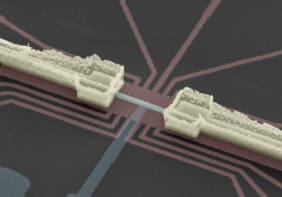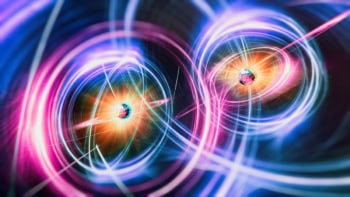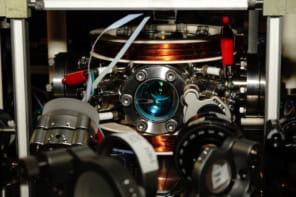
Imperfections in diamond enable a 10-qubit register – a collection of qubits that can store data in a quantum computer – report researchers at Delft University of Technology in the Netherlands and Element Six in the UK. Their diamond-based system is capable of preserving an arbitrary single-qubit state for over a minute – a record for a solid-state qubit. The multiqubit register signifies important progress in quantum-information processing, which requires a large number of qubits.
Realizing multiqubit registers is challenging for two reasons: the quantum gates require selective control of qubits, and unwanted interactions must be avoided to protect coherence in the register. Hence, the scientists developed an electron-nuclear two-qubit gate by using radio frequency pulses, which rotate nuclear spins with phase control, and alternating them with dynamical decoupling pulses on the electron spin to avoid unwanted interactions. Such a two-qubit gate accesses more nuclear spins than previous techniques and enables “high-fidelity” control of nuclear spin qubits. The fidelity of a quantum state expresses the “closeness” of that quantum state to the target quantum state. In this case a fidelity exceeding 0.5 with the target Bell state confirms genuine entanglement of all pairs of qubits.
PhD-researcher Conor Bradley at QuTech and the Kavli Institute of Nanoscience, both in Delft University of Technology, alongside his collaborators, based their qubits on a defect in diamond consisting of a nitrogen atom and an adjacent empty lattice site in place of two carbon atoms – a nitrogen-vacancy (NV) centre. The 10 qubits in their quantum register are the electron and nitrogen nuclear spins of the NV center, along with eight surrounding carbon-13 nuclear spins. Researchers then show that the register is fully connected by preparing entangled states for all 45 possible qubit pairs.
Google reports quantum supremacy in draft paper
The researchers also managed to generate N-qubit entanglement of up to seven qubits, which makes for better quantum algorithms. Furthermore, a nuclear spin qubit is a great contender for quantum memory as this research has reported the longest coherence times for individual qubits in the solid state. In their work at a temperature of 3.7 K Bradley and collaborators show that a state can be protected for over 75 s.
The study supervisor, Tim Taminiau, expects that the new method will be applied in other spin configurations in diamond, silicon and silicon carbide. In the QuTech news article he remarks: “Our findings pave the way for advanced quantum algorithms, quantum error correction and large multi-qubit quantum networks based on tens of solid-state spin qubits.”
Full details are reported in Physical review X.




